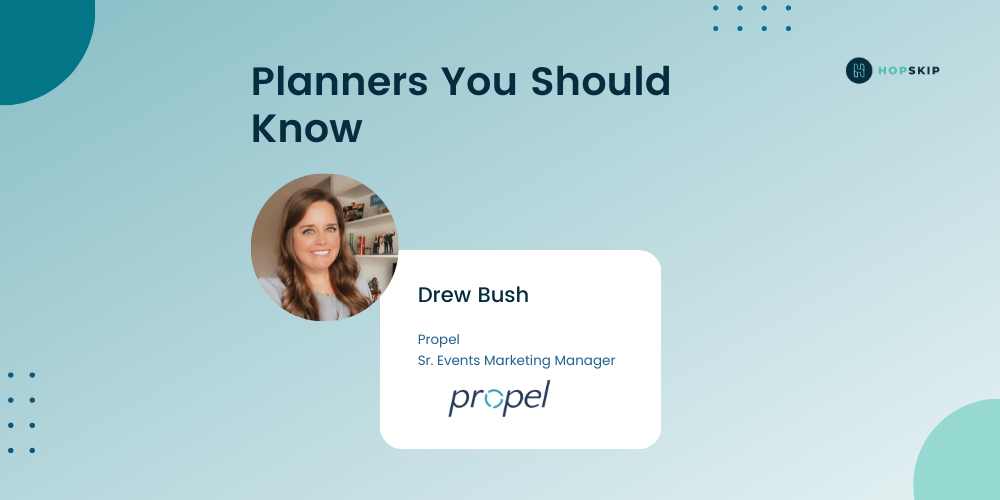Planners You Should Know - Drew Bush, Propel
Drew Bush, of Propel, discusses how she honed her skills over the pandemic to now be in position to overcome the challenges that the new meetings/events landscape brings.
Luke Whalin
Feb 27, 2023

This post is part of the HopSkip Planner Spotlight Series where HopSkip spotlights planners across the industry to bring awareness of how they adapted to COVID-19, communicating and lessons learned and sharing how they are viewing the meetings and events industry in a post-pandemic world.
Name: Drew Bush
Company Name: Propel
Job Title: Sr. Events Marketing Manager
Years of Experience: 15
How did you get your start in the events industry? What made you pursue this role?
I grew up watching my mom produce incredible experiences for people. The excitement and overwhelming happiness on their faces have always stuck with me. After managing some social events within my MBA program at my university, I set out to find a position in events - which wasn't easy. I landed an events marketing role with a local event production company that produces classic car shows nationwide - I knew nothing about classic cars or much about marketing, but I was willing to learn. I was with this organization for four years, mastering the art of grassroots and guerrilla marketing along with developing the skills and compassion to build relationships with customers, partners, sponsors, and volunteers. After moving on, I was given the incredible opportunity to move into the tech world and started off at a retail technology company. Many of my skills easily transferred from my first role, but this is when I really understood the importance of Demand Generation, building pipelines, and being responsible for driving revenue. My current role at Propel was brought to me, and while it's very similar in scope; there is always continuous learning about the manufacturing industry and those who are a part of it. Joining the smaller Demand Gen team allowed me to dig deeper into what works and doesn't.
How do you compare planning your first in-person event post-pandemic, to planning meetings/events pre- Covid? What was different and unique? What was similar?
What was your number one challenge in hosting your first in-person event(s) and how did you overcome it?
Is it even right to compare? In the event industry, we know that there is NO going back to 'normal'. This is just the way of the world. Major differences: budgets are tighter, attendance has to be viewed for quality over quantity, hospitality is far more important than before, events people have to think of all the possible ways to quickly pivot (or support an individual) if the event has to transition. I still stick with my original comment after hosting my first virtual event in October 2020 (350+ attendees): In-person events are significantly easier than virtual events!
The largest challenge for our team was re-learning the way people wanted to participate and making sure our invites were targeted enough to get the right audience to meet our objectives.
What is the top learning that you uncovered from the last two years that you’re implementing in your planning process today? (any other tips or tricks you want to share?)
Have a backup plan for your backup plan. But also let the things go that aren't in your control.
Continue to build those relationships, especially if you have to go to properties.
Due to the pandemic, our events community had to evolve, adapt, and grow. Many planners started to embrace new technologies as a result of the pandemic. What new tech are you using today in your planning process as a result?
This post is part of the HopSkip Planner Spotlight Series where HopSkip spotlights planners across the industry to bring awareness of how they adapted to COVID-19, communicating and lessons learned and sharing how they are viewing the meetings and events industry in a post-pandemic w,orld.
At Propel, we use Goldcast to host our virtual events and webinars. We love its ease of use for the attendee and all the engagement opportunities it allows. They are rapidly growing, and they've continued to impress our team with their product roadmap.
Since education and relationships are two major pillars in the meetings and events industry, any suggestions on how other planners can learn and network with their peers across the industry?
Join those groups on LinkedIn, and take time to read the articles posted. Connect with the Event Marketer with some of your vendors, partners, and sponsors - the continuous sharing of ideas is endless.